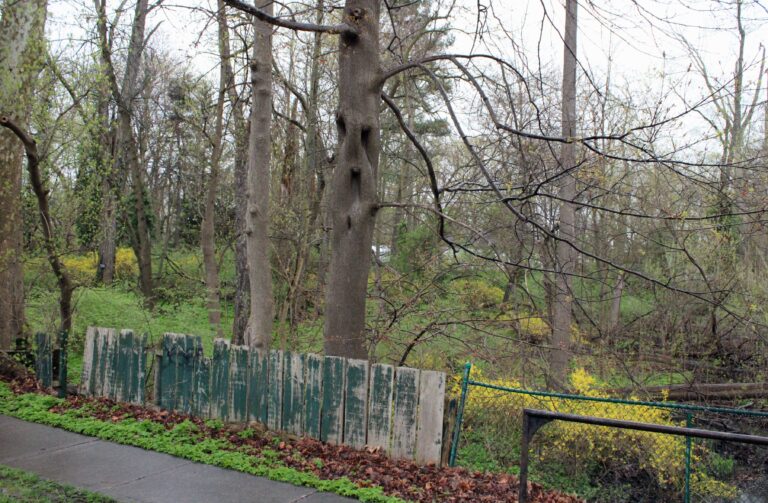Niagara developer Rainer Hummel is suing the Town of Niagara-on-the-Lake for $500,000, plus costs, in an application to quash a development freeze that was instituted by the town at a special meeting just days after the new council was inaugurated in 2018.
Known as an interim control bylaw, the development freeze prevented any new development in Old Town from going ahead for one year. It was subsequently extended for another year.
“The general reason we’re suing the town is … it is our belief that the initial interim control bylaw put in place was not legal,” said Hummel in an interview with The Lake Report.
In documents filed in the Superior Court of Ontario, his company, Hummel Properties Inc., alleges the town enacted the control bylaw without proper jurisdiction and for an improper purpose.
Specifically, Hummel claims the interim control bylaw should be quashed because it is not authorized by the Planning Act and no bona fide study or review was undertaken with respect to land use planning policies in town.
The lawsuit says that in passing the bylaw, the town acted contrary to principles of transparency, accountability and fairness.
Hummel also questions the timeline in which the bylaw was passed, and alleges the town, contrary to the provincial Planning Act, organized the interim bylaw in secrecy and that there couldn’t possibly have been time for due diligence.
The company claims it suffered damages as a result of the bylaw and through “misrepresentations” by Lord Mayor Betty Disero that the bylaw would be lifted soon after it was put in place.
“At 8:30 a.m. on Wednesday, Dec. 5, 2018, some 37 hours after its inaugural meeting, and contrary to announcement provisions in the procedural bylaw of the Town of NOTL, council held a special meeting … at which time it enacted the initial interim control bylaw,” says the court document.
“After the enactment of the (bylaw), the lord mayor of the town made assurance on several occasions beginning in February 2019, that the interim control bylaw would be short term and lifted in an expedient fashion,” the lawsuit says.
The town extended the bylaw for a second year (the maximum amount of time it can be active) on Nov. 11, 2019.
“It is our belief that the (interim control bylaw) that was originally put in place is not legal at all, and certainly, we believe the extension of the (bylaw) is also not legal,” Hummel said.
He said he is challenging the original bylaw, not the one-year extension.
“(The Municipal Act) clearly states that an (interim control bylaw) should be used extremely sparingly, very, very carefully, because it is an extremely powerful, powerful document,” Hummel said.
“It is a right given to municipalities by the province and the province expects it to be used very, very judiciously because it has no right of appeal. So when any town does this, no citizen can say, ‘Hold on a sec, you can’t do that,’” he said.
The initial bylaw can’t be appealed to the Local Planning Appeal Tribunal (LPAT). The extension can be appealed and Hummel said other developers have appealed it, including Solmar Development Corp. and Traditional Neighbourhood Developments Inc.
“If you know the recent Solmar case, (developer Benny Marotta) had a right of appeal to the heritage conservation committee. That was his quasijudicial avenue. He chose Superior Court and Superior Court said, ‘No, you have another avenue,’” Hummel said.
“No different than if I were to sue under the extension to the (bylaw), I would expect court to throw it out, because I can go to the LPAT if I don’t like it. But I didn’t have that choice on the first go around, and that’s the one that’s costing me a lot of money.”
He said the cost to him comes from development in Niagara-on-the-Lake having “absolutely ground to a halt.”
“I have property that I’m trying to develop and I can’t. And somebody did that, in my opinion, without the legal authority to do so. So, we’ve now potentially missed a window of sales opportunity for what we wanted to develop, because we can’t do it. So the land is sitting there, the money is sitting there.”
“The banks have cut off all financing for NOTL because of this,” he said. “So whether it’s the MacSweens, or whoever else — Josh Bice, Kekoo Gatta, everybody — their banks have now said, ‘Niagara-on-the-Lake is persona non grata.’”
Hummel said when such extreme legislation is used, it “sends shockwaves” through the entire industry.
“So trades who aren’t working right now, our tax base or assessment base is not growing. Where’s the money supposed to come from to pay the bills next year? We didn’t have houses built last year, we didn’t have a lot of stuff happen in the last year. We didn’t create assessment growth. It’s extremely damaging to a community. So as much fun as this may be for them to pass an (interim control bylaw), (the town) didn’t think it through.”
He said the desired outcome is to cover damages.
“We have shareholders we answer to and those shareholders have been damaged financially, so we want to seek damages for what we’ve lost. Secondly, we want to ensure that councils now and in the future understand their responsibility to the taxpayer with respect to the use of interim control bylaws.”
The law surrounding the use of an interim control bylaw is “very specific,” said Hummel.
“You can only pass an (interim control bylaw) for the purpose of conducting a study. The legislation is not vague here at all. An (interim control bylaw) is to give the municipality enough time to conduct a study into a situation that could affect the community, positively or negatively, if they need time to understand it. In other words, something got sprung on them that they need to get expert advice on and they need breathing room to do that.”
“What’s the study? What study did they do?” Hummel said.
“The claim is, ‘We had to do an (official plan amendment).’ If you read the (official plan amendment) that this council passed in August (2019), other than a few typo repairs it’s the same damn thing the last council did. There’s even some staff reports that say ‘we’re done.’”
“So what study did you conduct other than to take six or seven months to approve something that was already completed before you even passed the (development freeze). So what’s the study?”
“The bigger question, outside of my lawsuit, now you’ve extended the (freeze) — for what? You didn’t do a study then, what’s your study now?”
He said even if court does say that an official plan amendment is a study, the town approved it.
“If you approved it must be finished,” Hummel said.
“The only reason you can extend an (interim control bylaw) for the second year is because you didn’t have enough time to complete the study. But you passed it in August. What are you studying?”
Interim control bylaws are considered so severe under the Municipal Act that a municipality can only pass one for 12 months and one extension for another 12 months. Once a municipality has used an interim control bylaw, it cannot use another one for 36 months after the last one expired, Hummel said.
“So have there been any other (interim control bylaws) by a past council? The Town of NOTL is a corporation, whether Joe Smith is the mayor, whether you’re the mayor, it doesn’t make any difference. Who’s running it doesn’t matter, it’s the corporation that’s liable … if it passed an (interim control bylaw) under mayor (Pat) Darte, then for three years after the mayor Darte (bylaw) expires, you can’t have another one.”
Hummel said there were three interim control bylaws in the previous term and one was active during the time council passed the one he’s challenging.
The town had one in place for Parliament Oak, one restricting cannabis operations and “even those two together at the same time are questionable whether you’re even allowed to do that,” said Hummel.
“And then they passed a third one. Three (interim control bylaws) going on at the same time, when you’re not allowed to have them for 36 months after the last one expired. That’s going to be interesting to explain to the court.”
He said the town’s lawyer found a loophole in case law where a precedent was set allowing, the town to create an interim control bylaw while another one is in place, but there are “so many technicalities” that from a legal perspective it’s hard to understand.
Hummel has never sued a municipality in the past, he said.
He said two places that have become “very negative” in the eyes of the development community are St. Catharines and Niagara-on-the-Lake.
“We all know each other,” Hummel said, and some developers he knows have said they would never buy land in Niagara unless it came with a permit.
“We’ve damaged our reputation by doing nasty things like (the interim control bylaw).”



_(1).jpg)







